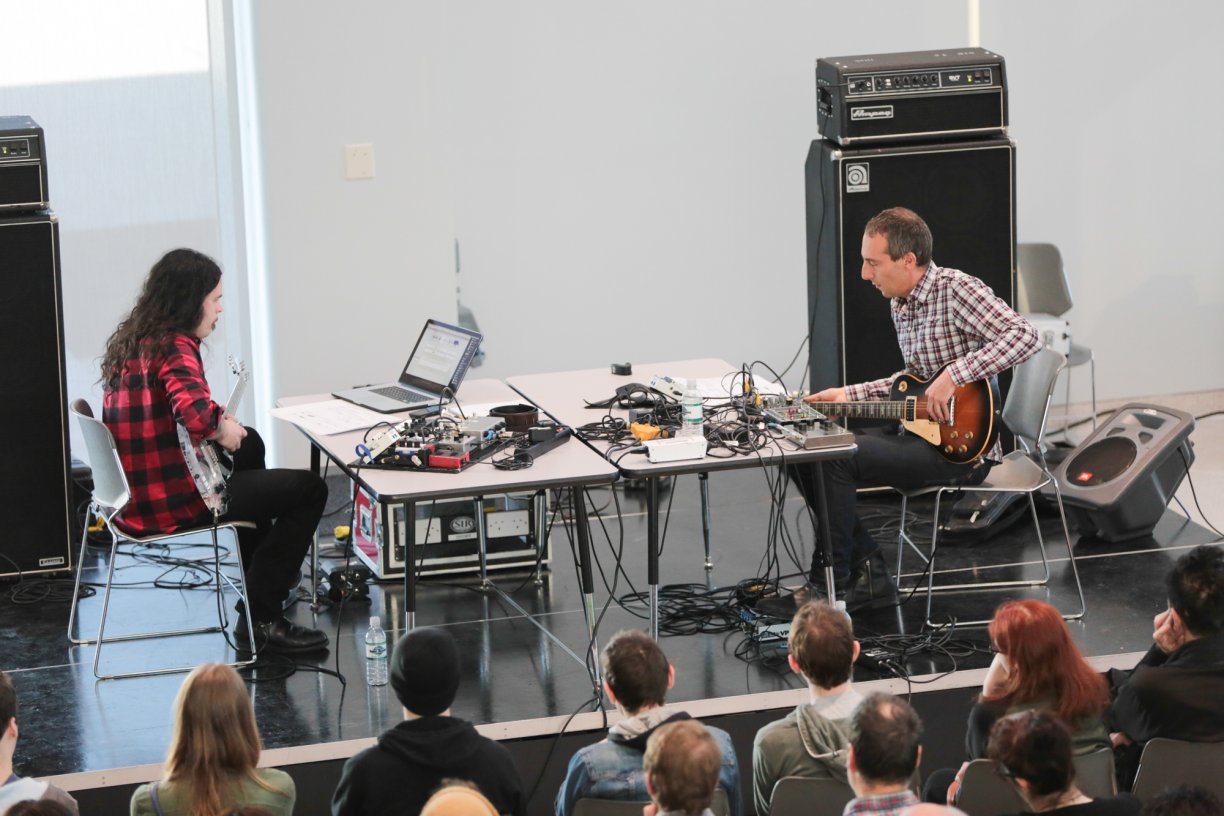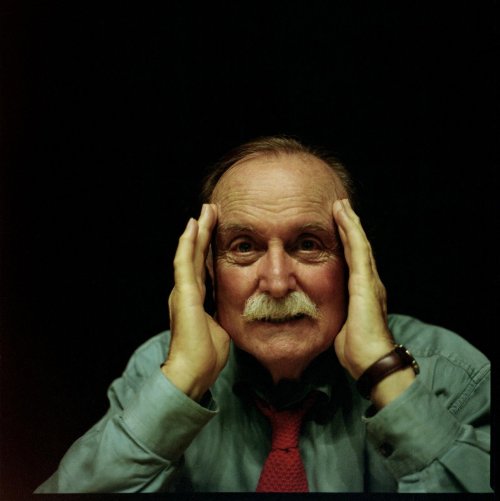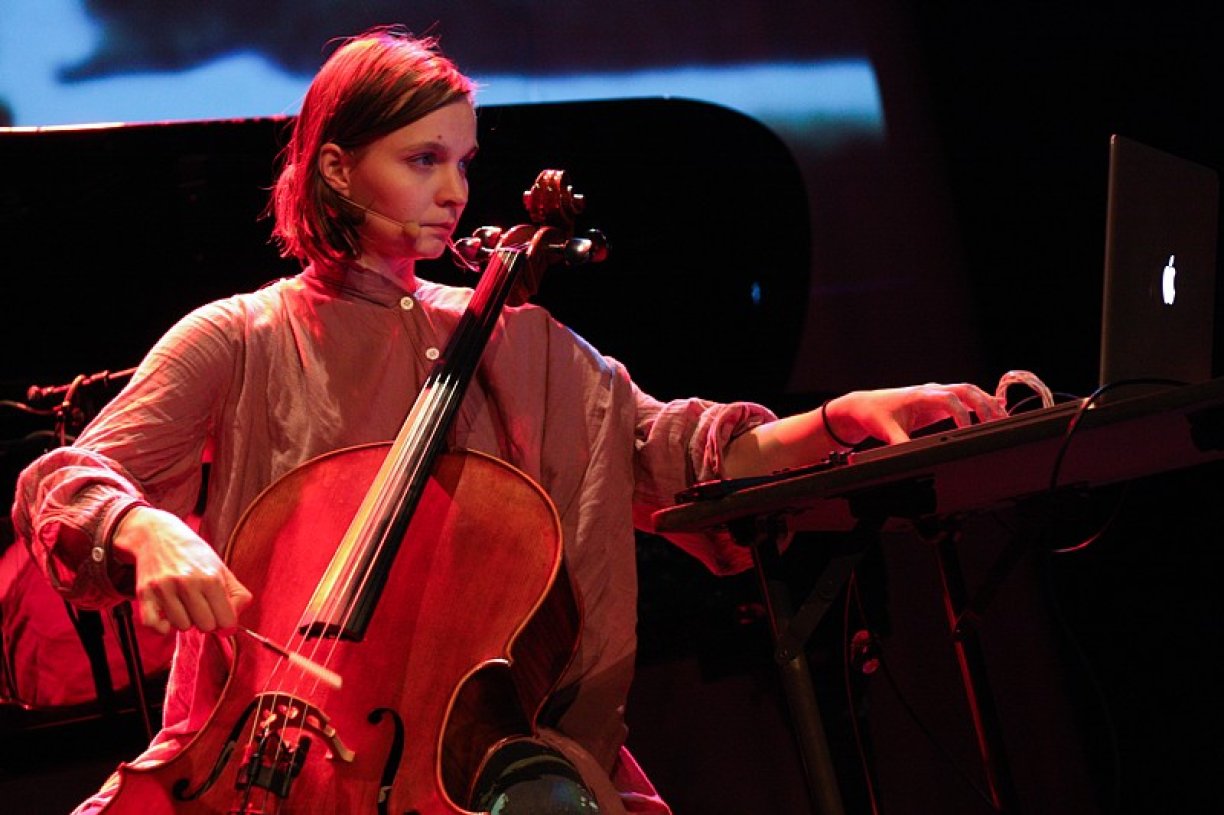Tectonics Festival New York opens with a special presentation of Alvin Lucier’s Criss Cross, featuring two pillars of experimental rock: Stephen O’Malley, a doom-metal legend of Sunn O)))) fame, and the celebrated guitarist, composer and multi-instrumentalist Oren Ambarchi. Originally premiered at Tectonics Glasgow in May 2013 and recently staged at Knoxville’s Big Ears Festival, this is the duo’s first NY appearance.
Jessika Kenney, a composer and vocalist who draws on South East Asian and Persian vocal traditions— as well as participating in experimental and metal groups including Sunn 0)))— performs solo and also joins Hildur Guðnadóttir, O’Malley and Ambarchi in the World Premiere of Reverse Tree, a newly commissioned work for ensemble by Eyvind Kang. Kenney also performs two works by Italian avant-gardist Giacinto Scelsi, one in a duo with Kang on viola. An ensemble of O’Malley, Ambarchi, Eli Keszler & Alan Zimmerman perform South Pole by Iancu Dumitrescu, a pioneering Romanian composer still not known enough. Canadian sound artist Crys Cole performs solo, drawing subtle and imperfect sounds from simple, meditative gestures.
Program
Eyvind Kang: Reverse Tree
Performed by Oren Ambarchi, Jessika Kenney, Hildur Guðnadóttir & Stephen O’Malley
Iancu Dumitrescu: South Pole
Performed by Oren Ambarchi, Stephen O’Malley, Eli Keszler & Alan Zimmerman
Alvin Lucier: Criss-Cross
Performed by Oren Ambarchi & Stephen O’Malley
Crys Cole: Solo performance
Jessika Kenney: Solo Performance
Giacinto Scelsi: Ho, for solo female voice
Giacinto Scelsi: Manto, for viola and voice
Performed by Evyand Kang & Jessika Kenney
Stephen O'Malley is the guitarist and founder of numerous seminal groups including Sunn O))), Khanate and Burning Witch among others. Born in New Hampshire and raised in Seattle, he eventually spent a decade in New York and presently is based in Paris. As a composer and musician he has been involved in hundreds of concerts and performances around the world over since 1993. He is a frequent collaborator of many outsider and experimental musicians, artists and composers in various formations, and has served as a link between the doom-metal and art spheres. His collaborators have included Boris, Merzbow, Jim O’Rourke, Keiji Haino and Oren Ambarchi to French theatre specialist Gisèle Vienne, American sculptor Banks Violette, Italian performance artist Nico Vascellari and Belgian filmmaker Alexis Destoop, among many others. Since 2011 he has curated the label Ideologic Organ.
Oren Ambarchi is a composer and multi-instrumentalist with longstanding interests in transcending conventional instrumental approaches. His works are hesitant and tense extended songforms located in the cracks between several schools: modern electronics and processing; laminal improvisation and minimalism; hushed, pensive songwriting; the deceptive simplicity and temporal suspensions of composers such as Morton Feldman and Alvin Lucier; and the physicality of rock music, slowed down and stripped back to its bare bones, abstracted and replaced with pure signal. From the late 90's his experiments in guitar abstraction and extended technique have led to a more personal and unique sound-world incorporating a broader palette of instruments and sensibilities. Ambarchi has performed and recorded with a diverse array of artists such as Fennesz, Otomo Yoshihide, Pimmon, Keiji Haino, John Zorn, Rizili, Voice Crack, Jim O'Rourke, Keith Rowe, Phill Niblock, Dave Grohl, Gunter Muller, Evan Parker, z'ev, Toshimaru Nakamura, Peter Rehberg, Merzbow and many more. Since 2004 Ambarchi has worked with American avant metal outfit Sunn 0))) contributing to many of their releases and side-projects including their Black One album from 2005 and the recent Monoliths & Dimensions release.
Eyvind Kang is a composer and violist who has released a dozen albums of original music, for example "The Narrow Garden" (Ipecac) and "Visible Breath" (Ideologic Organ). Eyvind often performs vocalist/composer Jessika Kenney, in many contexts including their works of austere beauty "Aestuarium" and "the Face of the Earth" (Ideologic 2011/12). As a violist he has worked extensively with Laurie Anderson and Bill Frisell, as well as presented solo works by Christian Wolff, Satyajit Ray and Hanne Darboven. He has also been a guest musician and arranger on hundreds of albums, including those by Sunn O))), Blonde Redhead, and Glass Candy.
Jessika Kenney is a composer and singer renowned for the different musical forms she has integrated into a distinct style. Her reverence for, and interpretations of South East Asian and Persian vocal traditions have formed the basis for her main improvisational work. Simultaneously, an ongoing series of collaborations with composer and violist Eyvind Kang, as well as several projects shared with experimental metal groups such as Sunn O))) and ASVA have her embracing the avant-garde audience. In 2009, she debuted “Atria” at Cornell, a work that combines the texts of spiritual teacher Ibn Muhyiddin Arabi, the Sufi poets Farid Uddin Attar and Mowlana Rumi and the Indonesian ruler Mangkunegara IV, performing alongside Kang and the innovative Gamelan Pacifica. "Concealed Unity" co-composed for choir and orchestra by Kenney and Kang has been performed at Iceland Tectonics and at the Winnipeg New Music festival.
Crys Cole is a Canadian sound artist working in improvised performance and sound installation. Active listening is the fundamental core of her practice. By drawing out subtle and imperfect sounds through simple purposeful gestures she aims to concentrate the listeners focus and in turn, reveal the broader sound environment that exists around and within us. Cole has exhibited work and performed extensively in live improvisation settings across Canada, Europe, Japan and in the USA, collaborating with an array of artists including Tetuzi Akiyama, Tim Olive, Christof Kurzmann, echo ho, Jamie Drouin & Lance Austin Olsen, Oren Ambarchi, Keith Rowe and many more.
Iancu Dumitrescu is a roman avant-garde musician. He received a master's degree in composition in Bucharest; Alfred Mendelssohn was among his teachers. He later studied conducting and philosophy with Sergiu Celibidache who led him to an engagement with the philosophy of Edmund Husserl and an effort to apply the principles of phenomenology to music. He began composing his mature works in the early 1970s. In 1976 he founded the Hyperion Ensemble, which he describes as "a multimedia group dedicated to experimental music". Dumitrescu has composed a large body of works for acoustic instruments and ensembles as well as works combining acoustic and electronic sounds and works composed entirely using tape or computer. In its emphasis on long tones that undergo transformations of timbre, Dumitrescu's music can be loosely grouped with that of Italian composer Giacinto Scelsi and with the spectral music of fellow Romanian Horațiu Rădulescu and the French composers of the spectral school.
Alvin Lucier was born in 1931 in Nashua, New Hampshire. He was educated in Nashua public and parochial schools, the Portsmouth Abbey School, Yale, and Brandeis and spent two years in Rome on a Fulbright Scholarship. From 1962 to 1970 he taught at Brandeis, where he conducted the Brandeis University Chamber Chorus which devoted much of its time to the performance of new music. Since 1970 he has taught at Wesleyan University where he is John Spencer Camp Professor of Music. Lucier is a composer of experimental music and sound installations that explore acoustic phenomena and auditory perception. Lucier has pioneered in many areas of music composition and performance, including the notation of performers' physical gestures, the use of brain waves in live performance, the generation of visual imagery by sound in vibrating media, and the evocation of room acoustics for musical purposes. His recent works include a series of sound installations and works for solo instruments, chamber ensembles, and orchestra in which, by means of close tunings with pure tones, sound waves are caused to spin through space.
Giacinto Scelsi (1905 – 1988) was an Italian composer who also wrote surrealist poetry in French. He is best known for writing music based around only one pitch, altered in all manners through microtonal oscillations, harmonic allusions, and changes in timbre and dynamics, as paradigmatically exemplified in his revolutionary Quattro Pezzi su una nota sola ("Four Pieces on a single note", 1959). His musical output, which encompassed all Western classical genres except scenic music, remained largely undiscovered even within contemporary musical circles during most of his life. A series of concerts in the mid to late 1980s finally premiered many of his pieces to great acclaim, notably his orchestral masterpieces in October 1987 in Cologne, about a quarter of a century after those works had been composed and less than a year before the composer's death. The impact caused by the late discovery of Scelsi's works was described by Belgian musicologist Harry Halbreich: “A whole chapter of recent musical history must be rewritten: the second half of this century is now unthinkable without Scelsi... He has inaugurated a completely new way of making music, hitherto unknown in the West. In the early fifties, there were few alternatives to serialism's strait jacket that did not lead back to the past.”
Percussionist Alan Zimmerman was born, reared, and educated in Texas. After spending time pursuing musical endeavors in Japan and Jamaica, he migrated to New York City in 1985, where he is currently Executive Vice-President at Kensico Properties.




